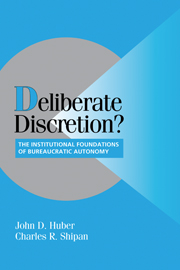Book contents
- Frontmatter
- Contents
- List of Tables
- List of Figures
- Preface
- 1 LAWS, BUREAUCRATIC AUTONOMY, AND THE COMPARATIVE STUDY OF DELEGATION
- 2 RATIONAL DELEGATION OR HELPLESS ABDICATION? THE RELATIONSHIP BETWEEN BUREAUCRATS AND POLITICIANS
- 3 STATUTES AS BLUEPRINTS FOR POLICYMAKING
- 4 A COMPARATIVE THEORY OF LEGISLATION, DISCRETION, AND THE POLICYMAKING PROCESS
- 5 LEGISLATION, AGENCY POLICYMAKING, AND MEDICAID IN MICHIGAN
- 6 THE DESIGN OF LAWS ACROSS SEPARATION OF POWERS SYSTEMS
- 7 THE DESIGN OF LAWS ACROSS PARLIAMENTARY SYSTEMS
- 8 LAWS, INSTITUTIONS, AND POLICYMAKING PROCESSES
- APPENDIX A MMC LAWS USED IN CHAPTER 3
- APPENDIX B POLICY CATEGORIES USED FOR MMC LAWS IN CHAPTER 3
- APPENDIX C PROCEDURAL CATEGORIES USED FOR MMC LAWS IN CHAPTER 3
- APPENDIX D THE FORMAL MODEL OF DISCRETION
- References
- Author Index
- Subject Index
- Titles in the series
8 - LAWS, INSTITUTIONS, AND POLICYMAKING PROCESSES
Published online by Cambridge University Press: 05 June 2012
- Frontmatter
- Contents
- List of Tables
- List of Figures
- Preface
- 1 LAWS, BUREAUCRATIC AUTONOMY, AND THE COMPARATIVE STUDY OF DELEGATION
- 2 RATIONAL DELEGATION OR HELPLESS ABDICATION? THE RELATIONSHIP BETWEEN BUREAUCRATS AND POLITICIANS
- 3 STATUTES AS BLUEPRINTS FOR POLICYMAKING
- 4 A COMPARATIVE THEORY OF LEGISLATION, DISCRETION, AND THE POLICYMAKING PROCESS
- 5 LEGISLATION, AGENCY POLICYMAKING, AND MEDICAID IN MICHIGAN
- 6 THE DESIGN OF LAWS ACROSS SEPARATION OF POWERS SYSTEMS
- 7 THE DESIGN OF LAWS ACROSS PARLIAMENTARY SYSTEMS
- 8 LAWS, INSTITUTIONS, AND POLICYMAKING PROCESSES
- APPENDIX A MMC LAWS USED IN CHAPTER 3
- APPENDIX B POLICY CATEGORIES USED FOR MMC LAWS IN CHAPTER 3
- APPENDIX C PROCEDURAL CATEGORIES USED FOR MMC LAWS IN CHAPTER 3
- APPENDIX D THE FORMAL MODEL OF DISCRETION
- References
- Author Index
- Subject Index
- Titles in the series
Summary
Legislators in modern democracies perform a wide variety of tasks, ranging from constituency service to the confirmation of political appointees. While these are significant activities in democracies, the most important function that legislators perform is making public policy. Citizens in representative democracies elect legislators to make laws, after all, and democratic theory holds that citizens will reelect those politicians who support policies they like and turn out of office those politicians who support policies they do not like.
In Chapter 1, we set out some examples of how politicians have taken different approaches to policymaking in different areas and in different political contexts. In the area of health care in the U.S. states, for example, we saw that Idaho and Texas took very diverse approaches to setting up a managed care system for Medicaid, with Idaho writing a very short, general, and vague law that authorized an agency to implement managed care and Texas writing a longer, more specific law that set out in greater detail what such a system should look like. Similarly, we saw differences between Germany and Ireland in the area of sexual harassment. While both countries passed laws designed to combat instances of sexual harassment, Ireland passed a precise, explicit law, while Germany wrote one that was much more ambiguous and open to interpretation.
As the rest of the book has demonstrated, such differences are not unusual but rather are systematic and even predictable.
- Type
- Chapter
- Information
- Deliberate Discretion?The Institutional Foundations of Bureaucratic Autonomy, pp. 210 - 230Publisher: Cambridge University PressPrint publication year: 2002

